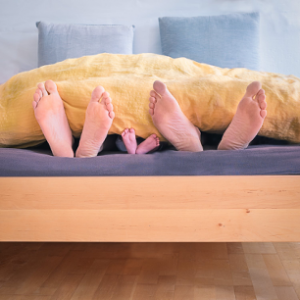Congratulations on your new baby! As a new mother, you may experience many changes, both physically and mentally. It is therefore important for you to practice good postnatal care and receive necessary support to recover from childbirth as you take on parenthood. Good postnatal care can also help to identify medical and physiological conditions that may occur after pregnancy and childbirth.
Particularly in Asian culture, new mothers traditionally undergo confinement for 30 days, or, up to an extended period of 3 months immediately after childbirth. During this period of post-partum recovery, depending on the culture you belong to, there may be many confinement rules to observe (Read: Confinement Myths), but generally, you can expect to gradually fall into a routine and adjust to your new normal. In the meantime, here are tips on getting the postnatal care in check as you get in the groove with the new addition:
Schedule rest
A family that gets enough rest stays together.
Getting sufficient rest is one of the most challenging things to achieve postnatal. The lack of rest can leave one feeling tired, more susceptible to emotional changes and slower recuperating for your childbirth wounds. Hormones are often out of whack during this period too, so it is important to rest. While you will need to make time for daily activities like eating, bathing (if preferred) and toilet breaks, you can aim for maximum rest by taking short naps throughout the day. As the saying goes “Sleep when your baby sleeps”, many mothers find it helpful to plan rest time around the baby’s sleep schedule.
Eat nourishing foods

Load up on greens to nourish your postpartum body.
Foods that are considered nourishing during confinement varies across cultures and traditions. In generally, maintaining a healthy diet of whole grains, proteins, fruits and vegetables as well as good amounts of fluid intake will give your body the necessary resources towards a speedy recovery from childbirth. Eating well is essential during the postnatal period to allow your body to heal and replenish lost blood and energy. If you are breastfeeding, it is necessary to ensure that you take in at least 2 litres of fluids daily, to stay hydrated.
Take a breather and focus on your wellbeing, new mummy!

Even a 5-min break can do wonders for you, new mum!
In the process of adjusting to motherhood, new mothers sometimes neglect caring about your own wellbeing. It is important to ensure that your postnatal period is a comfortable, happy and healthy one. This may be an overwhelming and stressful time; new mothers will benefit from being patient with yourself and to take breaks during the day to do what you enjoy doing. It can be as simple as reading the news, or, watching your favourite show – dedicating time to yourself can do wonders to your mind, body and soul!
Seek help whenever you need

Grandparents are often very willing helpers – consider roping them in as part of your postnatal care plans!
In order to prioritise rest and your well-being for postnatal recovery, do not hesitate to raise your hands to seek help or accept help from family and friends. (Read: How dads can help with breastfeeding.) Other than direct latching to breastfeed, others will be able to help you with things like preparing meals, run errands, care for other children at home, or even hold the fort for a few hours for you to have some me time or couple time. Remember, receiving help is less about the inability to cope on your own. It is more about prioritising your family’s needs during this recovery period with a vision on adjusting to the family’s new normal in the long run.
Motherhood takes time to adjust to and sharing feelings and the burden of problems with your family helps tackle them together, and brings you closer together as a family unit.
We hope this simple guide can help you transition into motherhood with more ease. Please feel free to share what you worked for you as part of your postnatal care plans.



